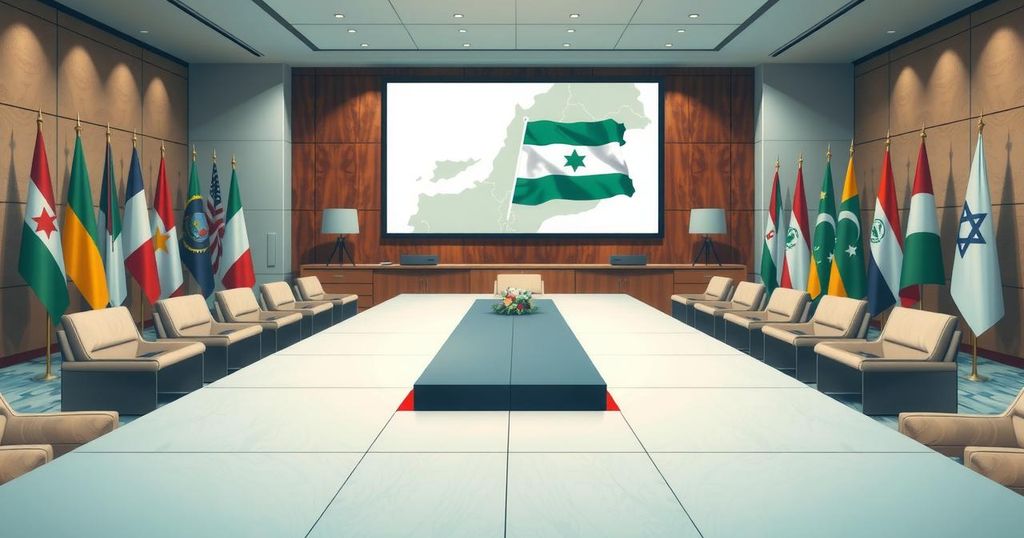The GCC Ministerial Council commended Qatar’s efforts for a Gaza ceasefire, supported by Egypt and the US, while promoting humanitarian aid and solidarity with the Palestinian people. The Council also addressed the need for regional stability in Syria, Lebanon, and Sudan, calling for reforms and cohesion among Arab states, alongside enhancing economic relations within the GCC framework.
The GCC Ministerial Council has expressed commendation for Qatar’s diplomatic efforts alongside Egypt and the United States in pursuing a ceasefire agreement in the Gaza Strip. The Council’s statement emphasized the importance of upholding this agreement, ceasing Israeli aggression, and facilitating the full withdrawal from Gaza and all Palestinian territories.
In concluding its meetings held in Makkah Al Mukarramah, the Council applauded Qatar for hosting the 2024 Doha Forum, themed “The Imperative of Innovation,” to be conducted on December 7, 2024. This event is recognized as a crucial arena for discussing significant global issues and challenges.
The Council also reviewed the advancements in Gulf cooperation as well as regional and international political developments. It reaffirmed its commitment to the GCC’s strength, unity among its members, and efforts towards increased integration and collaboration in multiple sectors.
Focusing on the situation in Gaza, the Council reiterated its solidarity with the Palestinian people, advocating for an end to the blockade and the efficient delivery of humanitarian assistance to alleviate their suffering.
The Ministerial Council endorsed the Palestinian-Egyptian-Arab plan established during the “Palestine Summit” in Cairo on March 4, 2025. The statement underscored that the future of Gaza should be framed within a unified Palestinian state and a two-state solution.
Additionally, the Council recognized the collective endeavors of GCC and Arab nations aimed at halting Israeli attacks, alongside humanitarian relief initiatives aimed at supporting the beleaguered inhabitants of Gaza.
The Council reaffirmed its support for the sovereignty and territorial integrity of Syria, urging the rejection of foreign interventions in its matters. It emphasized that Syria’s stability is essential for regional security.
In its discourse, the Ministerial Council expressed unwavering support for Lebanon’s sovereignty and stability while highlighting the necessity for comprehensive political and economic reforms to navigate Lebanon through its crises and prevent it from becoming a base for terrorism and criminal activities.
Regarding Sudan, the GCC underscored its commitment to preserving Sudanese sovereignty and stability while encouraging dialogue to resolve the ongoing crisis. The Council emphasized the need to support a return to civilian authority and maintain national cohesion.
On the broader geopolitical front, the Ministerial Council defined its stance on the Russian-Ukrainian conflict as aligned with international law, advocating for respect of state sovereignty and political independence.
Lastly, the Council welcomed outcomes from a joint ministerial meeting with representatives from Jordan, Egypt, Morocco, and Syria, emphasizing enhanced economic relations and negotiations for free trade agreements, which are seen as vital to bolstering the GCC’s international positioning.
The GCC Ministerial Council’s session highlighted significant regional issues, notably the situation in Gaza, underlining support for Palestinian autonomy and humanitarian relief. The Council’s emphasis on unity among GCC members and a collaborative approach in addressing Arab states’ crises reflects a commitment to stability and security in the region. The reaffirmation of positions regarding Lebanon and Sudan further underscores the GCC’s proactive foreign policy pursuits and dedication to fostering peace and development.
Original Source: www.gulf-times.com




